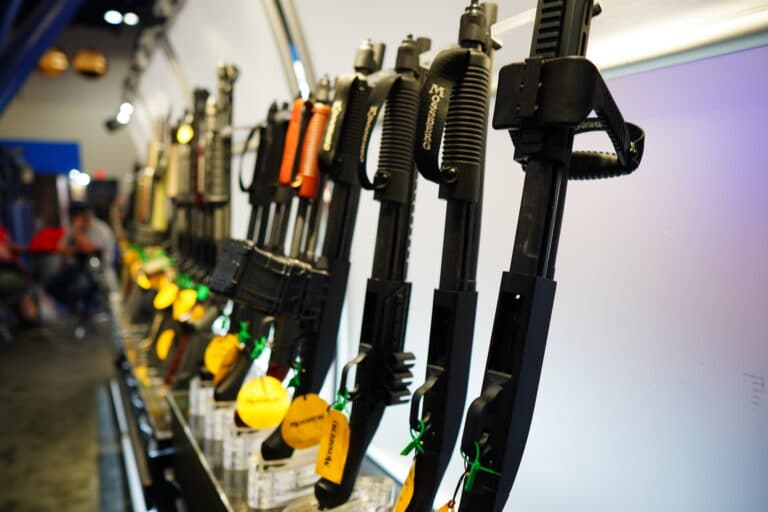The election has come but not yet gone. What can we glean about gun policy from the not-quite-complete results we have?
Guns weren’t a top issue for most voters or in most races. But there are a few contests that should be able to shed some light on the impact of gun politics this election.
As we dive into the results, there are two important things to keep in mind. First, we don’t know the full outcome of several key races that will determine control in either house of Congress. Second, winning or losing is not the only thing that matters in reading the tea leaves; how a candidate or initiative performed against expectations will likely matter even more to governing priorities and strategies for future campaigns.
Ballot Initiatives
The ballot initiatives are the easiest to judge since they feature voters directly answering gun policy questions. Of course, these are state-level questions. So, the makeup of the state needs to be considered as part of judging what message the final vote tally is sending.
In Iowa, there was an initiative to add the “right to keep and bear arms” to the state constitution alongside instructions that it is an individual right and judges must use the high bar of strict-scrutiny review for any gun laws challenged in state court. It passed by a considerable margin, according to the Associated Press.
That may be expected in a deep-red state like Iowa. However, the ballot initiative outperformed the incumbent Republican Senator and Governor by a wide margin as well–it received over 65,000 more votes than longtime Senator Chuck Grassley. That means many Democrats crossed over to vote for the pro-gun policy.
On the other hand, there’s the gun-control initiative in Oregon. The proposal to add a permit-to-purchase requirement to state law alongside a ban on possessing magazines holding more than ten rounds is still locked in a close battle. As of Thursday night, a winner has yet to be called by the AP, and support is at 50.9 percent, with 49.1 percent opposed.
If the percentages hold, it will represent a win for gun-control advocates. But this is in a deep blue state, and a paper-thin margin would likely signal this sort of policy is unlikely to pass in any state that’s less blue than Oregon. After all, the ballot initiative is running about 89,000 votes behind Democratic incumbent Senator Ron Wyden. It is running ahead of Tina Kotek, the Democrat who won the gubernatorial race, but that’s complicated by the fact a second Democrat ran as an independent and got about 150,000 votes. Combined, those two outpaced the gun-control initiative by over 94,000 votes.
That means a significant number of Democrats voted against the gun-control initiative in Oregon too.
So, the scoreboard may end up tied on the topline when it comes to the gun initiatives. But a closer look at expectations versus performance indicates gun-rights advocates may be happier with the outcome than gun-control advocates. And that’s before the likely court challenges the Oregon initiative will face if implemented.
Gubernatorial elections
The three key gubernatorial elections that featured guns as a top issue have all been called already, and we now have a clear picture of the winning margins as well.
In Texas, Republican Greg Abbott was able to defeat challenger Beto O’Rourke. And he did so in a convincing fashion. The AP has him up by 11 points in the final tally.
While it’s expected the Republican incumbent would bet a Democratic challenger in Texas, this was a much higher-profile race than in previous years. O’Rourke is one of the best-known and funded Democrats of the cycle. Yet he only improved slightly over the final margin Abbott put up against a less-formidable opponent and declined dramatically from his 2-point loss against Senator Ted Cruz (R.).
O’Rourke has also been the most aggressive gun-control candidate of the cycle. He continued to support confiscating AR-15s and AK-47s despite a few flip-flops during the race. His loss, especially in the state where the Uvalde shooting happened, is a significant rebuke of at least his approach to the issue. It’s hard to see anybody else embracing that position in a competitive race anytime soon.
In New York, Democrat Kathy Hochul held off Lee Zeldin to win her first full term. But the margin was less convincing here. She won by just 5.8 percent in the deep blue state.
There are a couple of ways you could read this outcome. On the positive end, gun-control advocates can argue that Hochul’s late turn to emphasizing her effort to implement new gun restrictions in the wake of the Supreme Court striking down the state’s gun-carry law helped forestall Zeldin’s rise. Perhaps it contributed to her pulling off a win?
On the other end, Republicans haven’t held the governor’s mansion since 2006. Her race finishing so close also likely contributed to Republicans picking up congressional seats throughout the state. So, it’s pretty unlikely future campaigns will model themselves after what Hochul did.
In Georgia, Republican Brian Kemp beat Democrat Stacey Abrams for a second time. The AP has him winning by 7.6 percent. That’s a more impressive accomplishment than the other two races when you look at the context.
Georgia is a much more purple state than either Texas or New York. Unlike those states, the two Georgia senators are from the opposite party as the victorious governor. And, while Raphael Warnock (D.) is headed to a runoff with his opponent, the incumbent senator got more votes than the Republican challenger.
So, Kemp fulfilling his promise to pass permitless gun-carry headed into the election season, which Abrams consistently attacked him over, at the very least, did not hurt his re-election effort. Perhaps it even helped him expand his margin of victory.
The topline results from these three races indicate one win for the gun-control side and two for the gun-rights side. But context tips the tally even further to the pro-gun side.
Gun Group Endorsements and Control of Congress
Things get a bit brighter for gun-control advocates when you look at how those endorsed by the gun groups performed. The lack of final results in a few of the election’s key races leaves the full picture partially obscured. However, it’s clear the Democrats outperformed expectations.
It remains possible Republicans will still win control of the House. But, with Democrats holding in Arizona, the best they can do in the Senate will be a tie. And even that will require them to win in Nevada and the coming runoff in Georgia. Even control of the House isn’t a complete lock yet, though it looks much more likely.
That’s a bad night for Republicans, given they were expecting to pick up dozens more House seats and as many as 54 senate seats going into the night. Since gun policy has become extremely polarized, a bad night for Republicans means a bad night for the endorsement record of gun-rights groups and vice versa for gun-control groups.
Of course, endorsements tell us less about the gun groups’ political strategies than where they actually spent their money. It will be a couple of weeks before we get a full accounting of their total spending for the cycle, but we know the races each side was focused on.
The NRA focused most of its efforts on the battleground senate races in Arizona, Wisconsin, Pennsylvania, Georgia, North Carolina, and Nevada. The gun-control groups spent much of their money on those races as well. Right now, North Carolina and Wisconsin are NRA wins, and Pennsylvania and Arizona are losses. Nevada remains too close to call, and Georgia is headed to a runoff, as mentioned above.
The gun-control groups also spent in gubernatorial and state-level races in Michigan and Colorado. The NRA didn’t contest those races to the same degree, but the Democrats backed by Everytown and Giffords pulled out big wins there. Brady PAC also spent on Reps. Steven Horsford of Nevada’s 4th district and Lucy McBath of Georgia’s 6th district.
McBath cruised to an easy win while Horsford leads in his race, but votes are still outstanding, and the AP has yet to call the race.
Ultimately, the failure to win control of the Senate is a significant blow to the NRA. That’s where they spent their money, and it didn’t pan out. Even if gun policy wasn’t the reason for the losses, it still amounts to a fruitless performance.
That leaves us with a somewhat muddled message about the effect of gun politics on the 2022 midterm elections. Overall, it was a better-than-expected night for Democrats. But gun politics weren’t a top issue for voters heading into the election, and early exit polls suggest that remained true on election day.
The outcomes weren’t necessarily cut and dry in the key races where guns got top billing. However, the results did tilt more toward gun-rights advocates. But it’s an open question whether it tilted enough to convince elected officials or their campaign strategists to dial back their ambitions for new gun restrictions.






